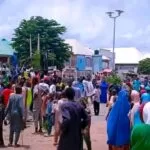
Hundreds of residents in Moriki town, Zamfara State, in northwestern Nigeria, staged a mass protest on Friday, Nov. 29, accusing neighbouring communities of collaborating with armed terrorists.
The protest, which disrupted access to the Moriki weekly market, lasted about five hours, beginning at 11:50 a.m. and concluding at 4:30 p.m.
During the demonstration, the aggrieved residents blocked roads and routes leading to the market. This prevented access to villagers from eleven surrounding communities, including Tudun Moriki, Tudun Sansami, Jaya, Karin Masu, and Kadage.
The protesters alleged that the affected communities had been colluding with terrorists who have long subjected Moriki to frequent attacks, killings, and abductions.
“We demand that the Nigerian government authorities should stop the accused residents from accessing our local community market because they are also the bandits,” Danbaba Ya’u, a resident of Moriki who also participated in the protest, told HumAngle.
“We always record terrorist attacks anytime residents of the ungoverned communities access our town without a halt from the government security operatives. They are infiltrating from their villages occupied by the terror gangs spying on us and feeding them with a lot of information about our affairs, movements and profiles.”
Ya’u alleged that security in Moriki started to decline when dozens of informants littered their streets and areas.
“Even though we paid ₦30 Million cash as a protection levy imposed on the Moriki community by the armed terror gang, we could not be freed to access our farmlands for the cultivation of our serial and cash crops for the whole season,” he added. “This is why the community blocked all means for the armed groups and the compromised villages from invading the Moriki territory.”
The protest saw participation from armed community members, vigilantes, and the government-backed Community Protection Guards. Nigerian military personnel and police officers were also deployed to ensure the demonstration did not escalate into violence.
Bawa Sarkin Tasha, another Moriki resident and a three-time victim of abduction, shared his distress with HumAngle. Currently, more than 17 of his innocent relatives are in the custody of the bandits, according to Tasha.
The armed groups continue to wreak havoc, particularly in the rural areas of Zurmi Local Government Area, where Moriki is situated, often exploiting the absence or limited presence of government security forces.
The constant attacks, which have persisted for years, have driven several communities in Zurmi to surrender to the bandits, offering intelligence and other forms of collaboration in exchange for protection. This complicity has further deepened mistrust and division among the local population.
For three consecutive weeks, residents accused of collaborating with the terrorists have been denied access to the Moriki market, a vital economic lifeline for the area. The situation underscores the widening chasm between the aggrieved residents of Moriki and the neighbouring communities accused of aiding terrorists.
Residents of Moriki town in Zamfara State, Nigeria, staged a protest against neighboring communities they accuse of collaborating with armed terrorists.
The protest, which lasted five hours, blocked access to Moriki’s weekly market, disrupting connections with eleven surrounding communities. Protesters allege that these communities assist terrorists in conducting attacks and gathering intelligence on Moriki, with local residents forced to pay a protection levy to armed gangs while being denied access to their farmlands.
The demonstrators, which included armed community members and vigilantes, were overseen by the military and police to prevent violence. The local tensions are fueled by past abductions and ongoing attacks, particularly on the outskirts of Zurmi Local Government Area, with some neighboring communities reportedly surrendering to bandits in exchange for protection.
As a result, alleged collaborators have been prohibited from entering the Moriki market for weeks, worsening divisions and mistrust among these communities.
